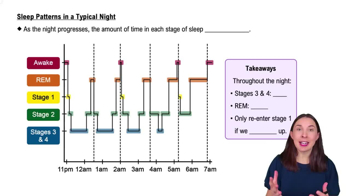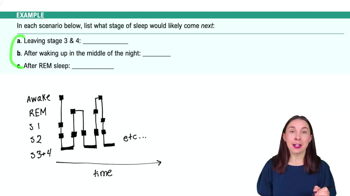Table of contents
- 1. Introduction to Psychology1h 43m
- 2. Psychology Research2h 20m
- 3. Biological Psychology2h 41m
- 4. Sensation and Perception28m
- 5. Consciousness and Sleep32m
- 6. Learning41m
- 7. Memory34m
- 8. Cognition37m
- 9. Emotion and Motivation35m
- 10. Developmental Psychology33m
- 11. Personality48m
- 12. Social Psychology41m
- 13. Stress and Health41m
- 14. Psychological Disorders44m
- 15. Treatment47m
5. Consciousness and Sleep
Sleep
Struggling with Psychology?
Join thousands of students who trust us to help them ace their exams!Watch the first videoMultiple Choice
Insulin and glucagon are hormones secreted by the _____ to control the levels of fats, carbohydrates, and proteins in the whole body.
A
pancreas
B
stomach
C
pituitary gland
D
liver
 Verified step by step guidance
Verified step by step guidance1
Identify the function of each organ listed in the options: pancreas, stomach, pituitary gland, and liver.
Understand the role of insulin and glucagon in the body. Insulin helps lower blood glucose levels, while glucagon increases them.
Determine which organ is responsible for secreting insulin and glucagon. Recall that these hormones are involved in regulating blood sugar levels.
Consider the pancreas, which is known for its role in the endocrine system, specifically in the regulation of blood sugar through hormone secretion.
Conclude that the pancreas is the organ that secretes insulin and glucagon to control the levels of fats, carbohydrates, and proteins in the body.

 3:25m
3:25mWatch next
Master Circadian Rhythms with a bite sized video explanation from Hannah Gordils
Start learningRelated Videos
Related Practice


































































































![Race, Genes and IQ Differences | Bret Weinstein [Mini Clip]](https://img.youtube.com/vi/IztL_m3pd70/mqdefault.jpg)



































































































